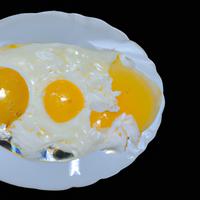
1 serving (50 grams) contains 70 calories, 6.0 grams of protein, 5.0 grams of fat, and 1.0 grams of carbohydrates.

Log this food in SnapCalorie

Nutrition Information
Calories |
331.2 | ||
|---|---|---|---|
% Daily Value* |
|||
| Total Fat | 23.7 g | 30% | |
| Saturated Fat | 7.1 g | 35% | |
| Polyunsaturated Fat | 0 g | ||
| Cholesterol | 0 mg | 0% | |
| Sodium | 307.6 mg | 13% | |
| Total Carbohydrates | 4.7 g | 1% | |
| Dietary Fiber | 0 g | 0% | |
| Sugars | 0 g | ||
| protein | 28.4 g | 56% | |
| Vitamin D | 189.3 mcg | 946% | |
| Calcium | 118.3 mg | 9% | |
| Iron | 4.3 mg | 23% | |
| Potassium | 283.9 mg | 6% | |
* Percent Daily Values are based on a 2,000 calorie diet. Your daily values may be higher or lower depending on your calorie needs.
Food Attributes
Source of Calories
About Egg replacement
Egg replacements are versatile substitutes commonly used in cooking and baking to mimic the binding, leavening, and moisture-providing functions of eggs. They are typically made from ingredients such as chia seeds, flaxseeds, applesauce, silken tofu, aquafaba (chickpea liquid), or commercial egg replacer powders, which often include potato starch and tapioca flour. While their exact composition varies, many options are plant-based, making them popular in vegan and allergy-friendly cuisines. Egg replacements are generally cholesterol-free, lower in calories, and can serve as a heart-healthy alternative to regular eggs. However, they may lack the complete protein profile and some micronutrients found in eggs, such as vitamin B12 and choline. Their suitability depends on the recipe, as they may not work well in dishes heavily reliant on egg structure, like soufflés. Perfect for vegan baking or egg-free diets, they provide a flexible solution tailored to specific dietary needs.



